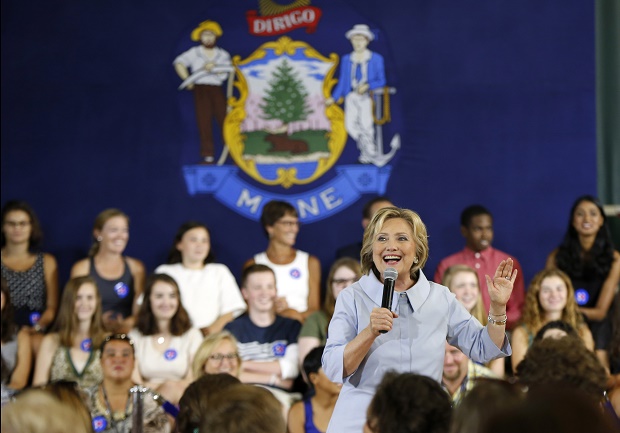
Democratic presidential candidate Hillary Rodham Clinton speaks at a campaign organizing meeting, Friday, Sept. 18, 2015, in Portland, Maine. AP
DURHAM, New Hampshire — Democratic presidential front-runner Hillary Rodham Clinton said Friday she was “appalled” that Republican rival Donald Trump declined to correct a questioner at a recent town hall meeting who incorrectly claimed President Barack Obama is Muslim.
Clinton told reporters that Trump and anyone seeking the White House should “start behaving like a president, to show respect and to stand up for truth.”
“He knew or he should have known that what that man was asking was not only way out of bounds, it was untrue, and he should have from the beginning repudiated that kind of rhetoric,” Clinton said following a town hall meeting at the University of New Hampshire.
READ: Trump declines to correct man who says Obama is Muslim
Clinton has repeatedly sought to contrast her leadership style with the Republican billionaire, who has built a lead in Republican primary polls and attracted large crowds to his rallies. Trump, the billionaire businessman, did not dispute the man’s comments at the Thursday night town hall meeting in New Hampshire and said he had heard others raise the issue previously.
“If that person had been at my event, I would have called him out on it,” Clinton said. “Not only is it out of place and wrong, it is totally factually untrue and quit impugning the integrity of the president.”
The Democratic presidential candidate declined to speak specifically about the debate performance of Republican Carly Fiorina, who confronted Trump during the televised event over comments he had made about Fiorina’s appearance. But she said all of the top Republican candidates on the debate stage supported “defunding Planned Parenthood and I vigorously disagree with that position.”
READ: Donald Trump tangles with Republican opponents in 2nd debate
Later, in Portland, Maine, Clinton confronted a small group of environmental activists who stood up during her organizing event and held signs that read, “I’m Ready for Hillary to say no KXL,” demanding she oppose the Keystone XL pipeline. Clinton has declined to take a position and expressed impatience with the Obama administration’s deliberations over whether to approve the pipeline, which would transport oil from Canada’s tar sands to refineries on the Gulf of Mexico.
“What I have said is you’ll hear from me shortly and you will, but you’re not going to hear from me today,” Clinton said. “So don’t interfere with other people being able to participate.”
In declining to take a stand on the pipeline, Clinton has said she doesn’t want to interfere with a decision that was under consideration while she served as secretary of state.
Clinton spoke at a town hall meeting at the University of New Hampshire to outline her campaign’s $350 billion plan to make college more affordable and reduce the burden of student debt. It aims to reduce the cost of four-year public schools, make two-year community colleges tuition-free based on a similar proposal by President Barack Obama, and cut student loan rates.
She made no mention of her Democratic rivals like Vermont Sen. Bernie Sanders but said Republicans had “taken aim” at higher education and sought to cut aid that makes school more affordable.
Clinton also signaled plans to confront the “for-profit” college industry, “who have been preying on our young veterans. It’s outrageous what some of these places have done — they entice young veterans to join and then it’s a fraud. We’re going to crack down on that.”
When a reporter asked Clinton how students should assess her college affordability plan compared with Sanders’ version, the former secretary of state said hers was “more comprehensive” at reducing costs and emphasized paying down student debt.
Sanders’ $70 billion annual proposal would eliminate tuition and fees for students attending public universities and would be funded by imposing a tax on transactions by hedge funds, investment houses and other Wall Street firms.